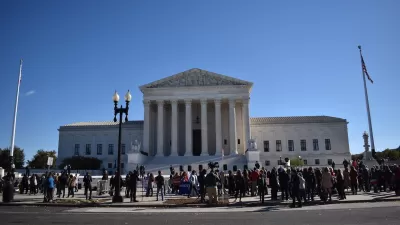The Supreme Court might decide on the constitutionality of inclusionary zoning. Local land use regulations and affordable housing policies in cities and communities all over the country hang in the balance.

Kriston Capps reports on the background and details of a court case expected to appear before the Supreme Court that amounts to whether inclusionary zoning is an unconstitutional government taking of private property.
The court case was born in Marin County, where two property owners, Dartmond and Esther Cherk, were forced to either include affordable housing or pay an in-lieu fee when trying to develop a residential parcel into two single-family-zoned lots.
Capps explains the stakes of a possible Supreme Court hearing for Dartmond Cherk, et al. v. Marin County, California.
The Marin County case may test the constitutionality of inclusionary zoning, a tool that local jurisdictions rely on to expand the supply of affordable housing, especially in tight housing markets. The court has expressed an interest in the case, which the justices may wind up using as a wedge to reshape property rights. It’s possible the inclusionary zoning ordinances—and local regulations more broadly construed—will not stand under the court’s scrutiny.
Capps explains the status of the case relative to the Supreme Court's interest in deciding the matter. "Housing advocates and industry associations are filing briefs on both sides of the case," according to Capps, and "the court asked Marin County for its response, which attorneys must file by October 7."
The Supreme Court's position on whether inclusionary zoning amounts to an unconstitutional taking could also have implications for land use regulations that have environmental outcomes in mind, according to Capps.
FULL STORY: Will the Supreme Court Strike Down Inclusionary Zoning?

Maui's Vacation Rental Debate Turns Ugly
Verbal attacks, misinformation campaigns and fistfights plague a high-stakes debate to convert thousands of vacation rentals into long-term housing.

Planetizen Federal Action Tracker
A weekly monitor of how Trump’s orders and actions are impacting planners and planning in America.

San Francisco Suspends Traffic Calming Amidst Record Deaths
Citing “a challenging fiscal landscape,” the city will cease the program on the heels of 42 traffic deaths, including 24 pedestrians.

Defunct Pittsburgh Power Plant to Become Residential Tower
A decommissioned steam heat plant will be redeveloped into almost 100 affordable housing units.

Trump Prompts Restructuring of Transportation Research Board in “Unprecedented Overreach”
The TRB has eliminated more than half of its committees including those focused on climate, equity, and cities.

Amtrak Rolls Out New Orleans to Alabama “Mardi Gras” Train
The new service will operate morning and evening departures between Mobile and New Orleans.
Urban Design for Planners 1: Software Tools
This six-course series explores essential urban design concepts using open source software and equips planners with the tools they need to participate fully in the urban design process.
Planning for Universal Design
Learn the tools for implementing Universal Design in planning regulations.
Heyer Gruel & Associates PA
JM Goldson LLC
Custer County Colorado
City of Camden Redevelopment Agency
City of Astoria
Transportation Research & Education Center (TREC) at Portland State University
Jefferson Parish Government
Camden Redevelopment Agency
City of Claremont





























